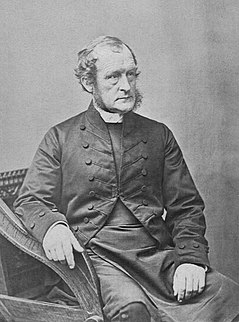
Alfred Marshall was an English economist, who was one of the most influential economists of his time. His book, Principles of Economics (1890), was the dominant economic textbook in England for many years. It brings the ideas of supply and demand, marginal utility, and costs of production into a coherent whole. He is known as one of the founders of neoclassical economics.

Sir (George) Gilbert Scott, styled Sir Gilbert Scott, was a prolific English Gothic revival architect, chiefly associated with the design, building and renovation of churches and cathedrals, although he started his career as a leading designer of workhouses. Over 800 buildings were designed or altered by him.

Augustus Welby Northmore Pugin was an English architect, designer, artist and critic who is principally remembered for his pioneering role in the Gothic Revival style of architecture. His work culminated in designing the interior of the Palace of Westminster in Westminster, London, England, and its iconic clock tower, later renamed the Elizabeth Tower, which houses the bell known as Big Ben. Pugin designed many churches in England, and some in Ireland and Australia. He was the son of Auguste Pugin, and the father of Edward Welby Pugin and Peter Paul Pugin, who continued his architectural firm as Pugin & Pugin. He also created Alton Castle in Alton, Staffordshire.

Thomas Arnold was an English educator and historian. Arnold was an early supporter of the Broad Church Anglican movement. He was the headmaster of Rugby School from 1828 to 1841, where he introduced a number of reforms that were widely copied by other prestigious public schools. His reforms redefined standards of masculinity and achievement.

Prince George, Duke of Cambridge was a member of the British royal family, a male-line grandson of King George III and cousin of Queen Victoria. The Duke was an army officer by profession and served as Commander-in-Chief of the Forces from 1856 to 1895. He became Duke of Cambridge in 1850 and field marshal in 1862. Deeply devoted to the old Army, he worked with Queen Victoria to defeat or minimise every reform proposal, such as setting up a general staff. His Army became a moribund and stagnant institution, lagging far behind the French Army and the German Army. Its weaknesses were dramatically revealed by the poor organisation at the start of the Second Boer War.

Sir Albert William Woods was an English officer of arms, who served as Garter Principal King of Arms from 1869 to 1904. The Woods family has a strong tradition of service at the College of Arms. Albert Woods was the son of Sir William Woods, Garter King of Arms from 1838 until his death in 1842. Likewise, the grandson of Albert Woods was Sir Gerald Woods Wollaston, who also rose to the rank of Garter King of Arms and served there from 1930 until 1944.

Henry Brooke Parnell, 1st Baron Congleton PC, known as Sir Henry Parnell, Bt, from 1812 to 1841, was an Irish writer and Whig politician. He was a member of the Whig administrations headed by Lord Grey and Lord Melbourne of the 1830s and also published works on financial and penal questions as well as on civil engineering. He was the great-uncle of Irish nationalist leader Charles Stewart Parnell.

George Percy, 5th Duke of Northumberland PC, styled Lord Lovaine between 1790 and 1830 and known as The Earl of Beverley between 1830 and 1865, was a British Tory politician. He served as Captain of the Yeomen of the Guard under Sir Robert Peel between 1842 and 1846. He succeeded to his peerage on 12 February 1865, after the death of his childless cousin Algernon Percy.

John Mason Neale was an English Anglican priest, scholar and hymnwriter.

Thomas Turton was an English academic and divine, the Bishop of Ely from 1845 to 1864.

George Augustus Selwyn was the first Anglican Bishop of New Zealand. He was Bishop of New Zealand from 1841 to 1869. His diocese was then subdivided and Selwyn was Metropolitan of New Zealand from 1858 to 1868. Returning to Britain, Selwyn served as Bishop of Lichfield from 1868 to 1878.

John Lonsdale was the third Principal of King's College, London, and later served as Bishop of Lichfield.

Harvey Goodwin was a Cambridge academic and Anglican bishop, Bishop of Carlisle from 1869 until his death.

William Otter was the first Principal of King's College, London, who later served as Bishop of Chichester. He was educated at Jesus College, Cambridge where he was later made a fellow. He was appointed Principal of the newly established King's College, London, in 1831, and held the post until 1836 when he was appointed Bishop of Chichester.
The Rt Rev Owen Emeric Vidal, DD was the Anglican Bishop of Sierra Leone from 1852 until his death three years later.

Joseph Holden Pott (1759–1847) was an English churchman, archdeacon of London from 1813.
Robert Wilson Evans was an English cleric and author, Archdeacon of Westmorland from 1856 until his death a decade later.

George Tomlinson was an English cleric, the Anglican Bishop of Gibraltar from 1842 to 1863.
Edward Atkinson was Master of Clare College from 1856 to his death.
William Charles Salter was a Church of England clergyman, Fellow of Balliol College, Oxford, and the last Principal of St Alban Hall.















